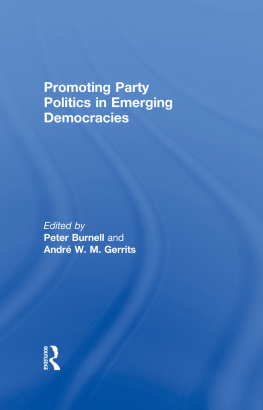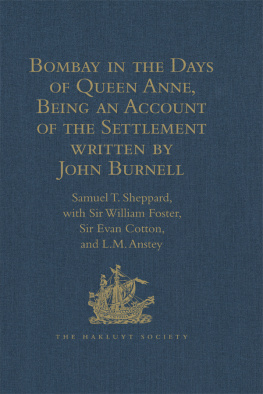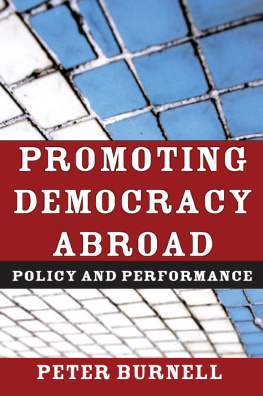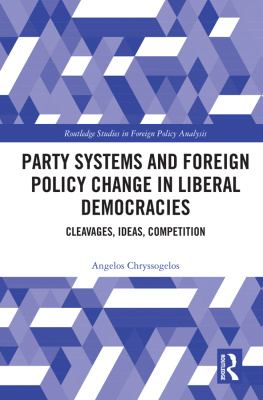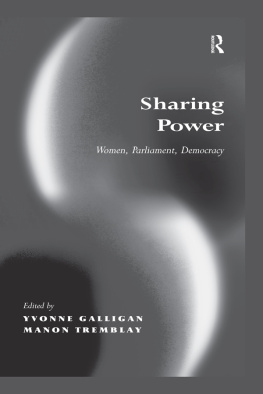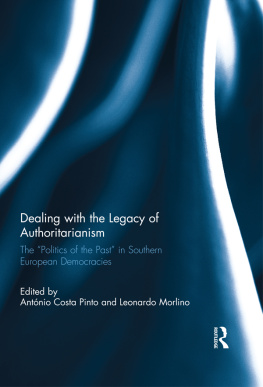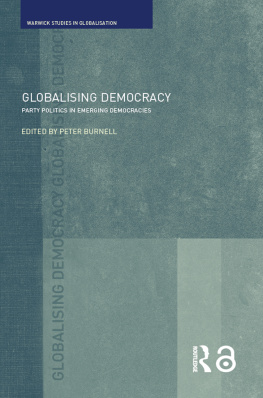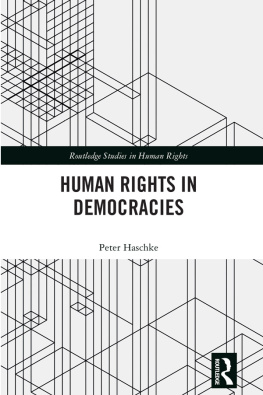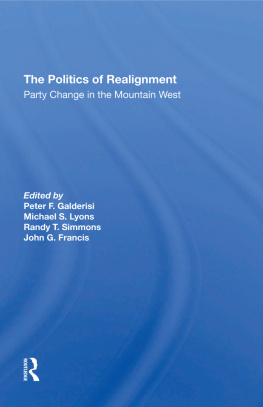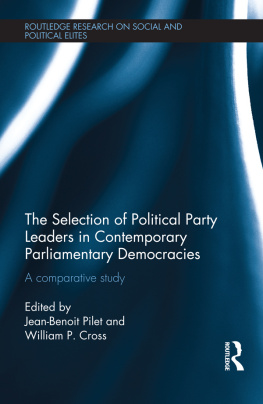Promoting Party Politics in Emerging Democracies
This book offers a critical and comparative examination of international support to political parties and party systems in emerging and prospective new democracies in several world regions. It combines the insights of a strong international grouping of leading academics and pioneering doctoral studies, and draws on extensive new field work inquiries. The wide-ranging coverage pools evidence from countries in Europe, Africa, East Asia and Central America. The book shows how far international support still has to go if it is to achieve its aims of helping party politics make a constructive contribution to furthering democracy. It advances our understanding both of the role the political parties are playing in the different polities and the sometimes negative impact of democracy promotion actors from outside.
By contributing original theoretical perspectives and empirical findings, the book points the way forward to agendas for future research and new courses of action. It will be of interest to academics and the policy-making and practitioner communities alike.
This book was originally published as a special issue of Democratizations.
Peter Burnell is a Professor in the Department of Politics and International Studies, University of Warwick, England.
Andr W. M. Gerrits is Professor of Russian Studies at Leiden University, The Netherlands.
Promoting Party Politics in Emerging Democracies
Edited by
Peter Burnell and Andr W. M. Gerrits
First published 2012
by Routledge
2 Park Square, Milton Park, Abingdon, Oxon, OX14 4RN
Simultaneously published in the USA and Canada
by Routledge
711 Third Avenue, New York, NY 10017
Routledge is an imprint of the Taylor & Francis Group, an informa business
2012 Taylor & Francis
This book is a reproduction of Democratizations, vol. 17, issue 6. The Publisher requests to those authors who may be citing this book to state, also, the bibliographical details of the special issue on which the book was based.
All rights reserved. No part of this book may be reprinted or reproduced or utilised in any form or by any electronic, mechanical, or other means, now known or hereafter invented, including photocopying and recording, or in any information storage or retrieval system, without permission in writing from the publishers.
Trademark notice: Product or corporate names may be trademarks or registered trademarks, and are used only for identification and explanation without intent to infringe.
British Library Cataloguing in Publication Data
A catalogue record for this book is available from the British Library
ISBN13: 978-0-415-59423-3
Typeset in Times New Roman
by Taylor & Francis Books
Disclaimer
The publisher would like to make readers aware that some chapters in this book may be referred to as articles as they had been in the special issue. The publisher accepts responsibility for any inconsistencies that may have arisen in the course of preparing this volume for print.
Contents
Peter Burnell and Andr Gerrits
Max Bader
Marlene Spoerri
John W. Hulsey
Maja Nenadovi
Jeroen de Zeeuw
Nicole Bolleyer and Lise Storm
Kristina Weissenbach
Lise Rakner and Lars Svsand
Gero Erdmann
Max Bader is a Post-Doctoral Researcher and Lecturer at the Geschwister-Scholl-Institute for Political Science at the University of Munich, Germany.
Nicole Bolleyer is Lecturer in Politics at the Department of Politics, University of Exeter, United Kingdom.
Peter Burnell is a Professor in the Department of Politics and International Studies, University of Warwick, United Kingdom.
Jeroen de Zeeuw is a Programme Officer/Policy Advisor for Sudan at the Catholic Organisation for Relief and Development Aid (Cordaid) in The Hague, The Netherlands. The views expressed by him are personal opinions of the author and should not be attributed to Cordaid.
Gero Erdmann is with the GIGA German Institute of Global and Area Studies, Hamburg, where he heads the Research Programme on Legitimacy and Efficiency of Political Systems. He is also Head of the GIGA Berlin Office, Germany.
Andr Gerrits is Professor of Russian Studies at Leiden University, The Netherlands.
John W. Hulsey is a visiting Assistant Professor in Political Science at James Madison University and a PhD candidate at Indiana University, Bloomington, United States of America.
Maja Nenadovi is a PhD candidate in the Department of European Studies at the University of Amsterdam, The Netherlands.
Lise Rakner is Head of Department and Professor of Comparative Politics at the University of Bergen, and she is affiliated with the Chr. Michelsen Institute, Bergen, Norway.
Marlene Spoerri is a PhD candidate in the Department of European Studies at the University of Amsterdam, The Netherlands.
Lise Storm is Senior Lecturer in Middle East Politics at the Institute of Arab and Islamic Studies, University of Exeter, United Kingdom.
Lars Svsand is Professor of Comparative Politics, University of Bergen, Norway.
Kristina Weissenbach is Research Fellow and Lecturer at the Institute of Political Science and the NRW School of Governance at the University of Duisburg-Essen, Germany.
Peter Burnella and Andr Gerritsb
aDepartment of Politics and International Studies, University of Warwick, Coventry, UK; bRussian Studies, Leiden University, The Netherlands
This opening section briefly introduces international political party support, that is, assistance to political parties by international organizations, mostly from the US and Europe, to strengthen individual political parties, to promote peaceful interaction between parties and to help to create a more stable and democratic environment for political parties in new, struggling or flawed democracies. Before going on to introduce the contributions to this collection, this introduction discusses three major issues related to international support to political parties: the current party crisis in young as well as in old democracies; the intrusive (political) nature of international party assistance; and the difficulties involved in assessing its effectiveness. Political parties seem much more difficult to work with than (other) political and civil society organizations. Subsequently, we will turn to the case studies, which focus on the former Soviet Union, the Balkans, and Africa, with excursions into Cambodia and El Salvador. Most of the contributions dwell on two contrasting country cases, and all of them combine attention to the state of political parties and party systems in their respective countries with the role played by international involvement and party support in particular. We will briefly present and discuss the major issues raised for international party support in the country studies, and try to formulate an answer to the question about where and when party support might make a meaningful contribution to supporting democratic transformation and consolidation.
Practically every publication on international support for political parties in new and emerging democracies starts from the same paradoxical observation: on the one hand political parties should be considered as essentially important for a well-functioning democracy, while on the other hand parties often function poorly and are generally held in low esteem. Political parties inadequately perform the functions they are expected to fulfil. These include interest articulation and aggregation, political participation, elite recruitment, and governance. Parties frequently suffer from such limited legitimacy that they tend to undermine rather than support the often feeble democratic order in many countries. Political parties are often seen as the weakest link in democratic transformation.1 Arguably, international support to political parties, one aspect of a larger democracy assistance effort, is designed to overcome this paradox, to bridge the gap between the crucial role of political parties in representative democracies and their generally poor performance and reputation among the citizens of many countries. Interestingly, the problematic state and standing of many political parties does not remain limited to new, struggling, or seriously flawed democracies. Many long-established democratic countries also have their own crisis of parties too.


